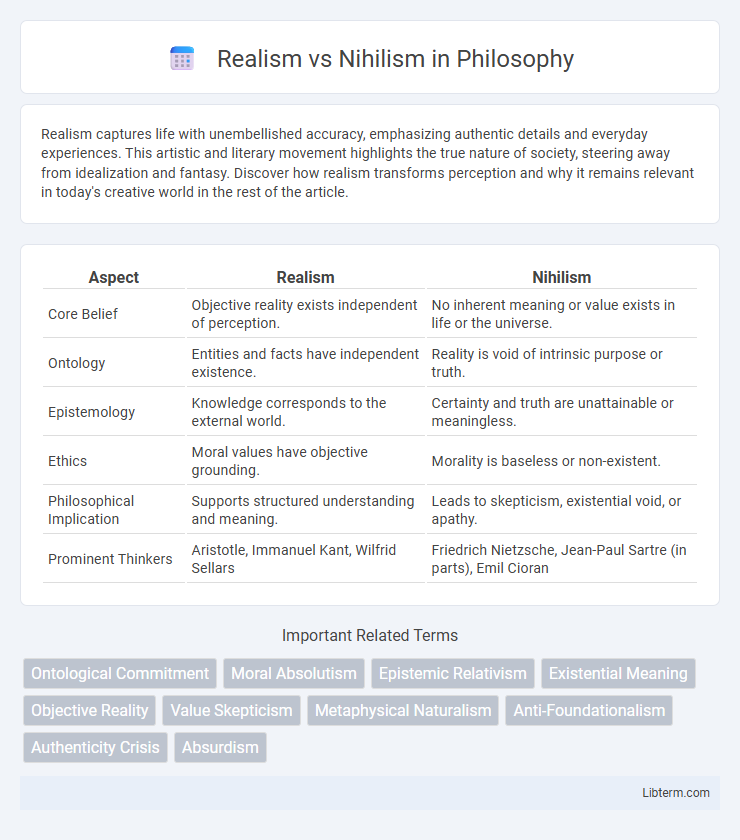Realism captures life with unembellished accuracy, emphasizing authentic details and everyday experiences. This artistic and literary movement highlights the true nature of society, steering away from idealization and fantasy. Discover how realism transforms perception and why it remains relevant in today's creative world in the rest of the article.
Table of Comparison
| Aspect | Realism | Nihilism |
|---|---|---|
| Core Belief | Objective reality exists independent of perception. | No inherent meaning or value exists in life or the universe. |
| Ontology | Entities and facts have independent existence. | Reality is void of intrinsic purpose or truth. |
| Epistemology | Knowledge corresponds to the external world. | Certainty and truth are unattainable or meaningless. |
| Ethics | Moral values have objective grounding. | Morality is baseless or non-existent. |
| Philosophical Implication | Supports structured understanding and meaning. | Leads to skepticism, existential void, or apathy. |
| Prominent Thinkers | Aristotle, Immanuel Kant, Wilfrid Sellars | Friedrich Nietzsche, Jean-Paul Sartre (in parts), Emil Cioran |
Understanding Realism: Core Principles
Realism centers on the belief that an objective reality exists independent of human perception, emphasizing observable facts and tangible evidence. It asserts that truth is discoverable through scientific inquiry and rational analysis, grounded in the external world's consistency and structure. This philosophical stance opposes subjective interpretations by prioritizing empirical validation and the existence of universal truths.
Defining Nihilism: Key Concepts
Nihilism is defined by the rejection of intrinsic meaning, values, or purpose in life and the universe, contrasting sharply with Realism's assertion of objective truths. Key concepts include existential nihilism, which denies inherent meaning in human existence, and moral nihilism, which disputes the existence of absolute ethical standards. These foundational ideas challenge the assumptions of Realism by asserting that reality lacks inherent significance or value.
Historical Origins of Realism and Nihilism
Realism emerged in the 19th century as a literary and artistic movement emphasizing accurate, unembellished representation of everyday life, influenced by Enlightenment thought and the rise of scientific observation. Nihilism, rooted in 19th-century Russian philosophy and notably articulated by Friedrich Nietzsche, confronts the rejection of inherent meaning or value in life and morality. The historical divergence of Realism's commitment to objective reality contrasts sharply with Nihilism's skepticism of universal truths and established norms.
Philosophical Foundations Compared
Realism asserts the existence of an objective reality independent of human perception, grounded in metaphysical commitments to the mind-independent world. Nihilism denies inherent meaning or value in life, positing that metaphysical claims, including those about objective truth, lack foundation. The philosophical tension arises as realism upholds truth and knowledge as discoverable, while nihilism challenges the existence of absolute truths, leading to divergent ontological and epistemological frameworks.
Realism vs Nihilism: Perspectives on Reality
Realism asserts that an objective reality exists independently of human perception, where facts and truths are discoverable through observation and reason. Nihilism challenges this by denying inherent meaning or value in existence, positing that reality is devoid of objective purpose or truth. These perspectives offer contrasting views on the nature of reality, with Realism emphasizing certainty and external truths, while Nihilism highlights existential skepticism and meaninglessness.
Meaning and Value: A Philosophical Divide
Realism asserts that meaning and value exist independently of human perception, grounding them in objective reality and universal truths. Nihilism denies inherent meaning or value, viewing these concepts as human constructs without objective basis. This philosophical divide influences ethics, with realism supporting moral absolutes and nihilism challenging the existence of intrinsic moral standards.
Realism’s Approach to Truth and Knowledge
Realism posits that truth and knowledge exist independently of human perception, asserting an objective reality accessible through observation and reason. This philosophical stance emphasizes that facts and truths have a concrete basis in the external world, regardless of beliefs or interpretations. Realists argue that scientific methods and empirical evidence are essential tools for uncovering and validating knowledge about reality.
Nihilism’s Rejection of Objective Meaning
Nihilism asserts that life lacks inherent purpose, rejecting any objective or universal meaning in existence. This philosophical stance denies the validity of absolute truths, claiming that values, beliefs, and morals are human constructs without intrinsic significance. Realism, by contrast, upholds that objective meanings and truths exist independently of human perception, emphasizing a concrete foundation for understanding reality.
Critiques and Defenses of Both Worldviews
Realism faces critiques centered on its assumption of an objective reality independent of perception, which some argue overlooks the subjective nature of human experience and the influence of cultural contexts. Defenses of realism emphasize the consistency of scientific inquiry and empirical evidence as foundations for understanding an external world that exists regardless of individual beliefs. Nihilism is criticized for its potential to foster existential despair and moral relativism, while advocates argue it provides a liberating framework that challenges imposed meanings and encourages authentic personal freedom.
Realism and Nihilism in Modern Thought
Realism in modern thought emphasizes the existence of an objective reality independent of human perception, asserting that truths about the world can be discovered through scientific inquiry and rational analysis. Nihilism challenges these assumptions by denying inherent meaning or value in life, often arguing that objective knowledge and moral truths are unattainable or nonexistent. The ongoing dialogue between realism and nihilism shapes contemporary philosophy, influencing debates in ethics, epistemology, and metaphysics.
Realism Infographic

 libterm.com
libterm.com